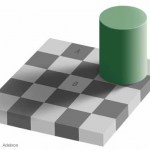Science
I gave a talk today on blogs as a tool for science communication (basically the same as this one, with a few minor updates), and got asked "Aren't the people who read science blogs mostly scientists already?" Which reminded me that it's been a while since I did a "Who are you people?" post.
So, if you've got a minute, leave a comment to this post, telling me something about who you are and how you got here. And if you want to throw in something about what you particularly like to read, or would like to see more of here, that sort of feedback is always helpful.
Thanks in advance.
A pretty straightforward question: Which prime number do you like the best?
What's your favorite prime number?online surveys
This is a purely classical poll, so you only get to choose one favorite, not a superposition of multiple numbers. Your selection is legally binding, so choose wisely!
(There's actually a point to putting this up today, beyond providing some cheap and easy blog traffic... I'll explain later.)
Psychologist Robert Kurzban's new book promises to explain Why Everyone (Else) Is a Hypocrite. It's a bold promise, and I was skeptical when first invited to review it. But Kurzban delivered - hilariously, entertainingly so. Although since I agree with almost everything he writes, I may not be the most objective of critics. (FYI: this is a long review, so if you're short on time, you can skip to the end of the post, and watch the author's short video trailer about the book. Cheers.)
For starters, Kurzban has convinced me to be more careful when I talk and write about my brain (and yours).…
I am currently working on a section of the BECB (the big evoluition/creation book) in which I discuss some of the legal history of the issue. Towards that end I just read the opinions of the Tennessee Supreme Court in the Scopes Trial. The Court addressed a number of issues, but we shall save that for a different post.
Mostly I just wanted to call attention to an amusing statement from one of the opinions:
The following statement of Dr. E.N. Reinke, Professor of Biology in Vanderbilt University, is repeatedly quoted in briefs of counsel for the defense:
“The theory of evolution is…
I'm giving a talk at the AAAS meeting next month on international physics tests, and they have asked me to provide information that they will duplicate and distribute to the media. Items requested include:
-- A one-paragraph biographical sketch (not a C.V.)
-- A lay-language summary of your talk, beyond the abstract.
-- The full text of your talk or a related (ideally recent) technical
paper, either as a Word file or a PDF. PowerPoint presentations are
acceptable, but a full text will better serve reporters' needs.
The first two are no big deal, but the third is kind of weird. I don't…
The latest snowstorm is wreaking some havoc on my plans for the day, which means I'm going to lift another question and answer from the Physics Stack Exchange, with some modification. This one is a question about thermal radiation:
What are the quantum mechanisms behind the emission and absorption of thermal radiation at and below room temperature? If the relevant quantum state transitions are molecular (stretching, flexing and spin changes) how come the thermal spectrum is continuous? What about substances (such as noble gases) which don't form molecules, how do they emit or absorb thermal…
The Edge annual question and its answers are out. This year, John Brockman asked, "What scientific concept would improve everybody's cognitive toolkit?" He got 158 people to send in answers.
I was one of them. If you like my answer, you might also like Sean Carroll's and Carl Zimmer's — we seem to have made similar points. Carl has a thread on the topic, and so does Sean: I think I like his original title of dysteleological physicalism better, never mind Carl's post deploring jargon.
Observatory is hosting another great event tonight:
From Heumann Heilmittel, "Eine Reise durch den menschlichen Körper" (1941)
Body Voyaging: an illustrated lecture with Kristen Ann Ehrenberger
Date: TONIGHT, Monday, January 17th
Time: 8:00 PM
Admission: $5
Presented by Morbid Anatomy
We human beings have a seemingly insatiable desire to experience the bodies underneath our skins. While many scholars have treated the subject of looking into or through bodies via medical imaging, one perhaps understudied trope is that of "body voyaging." A few writers and artists have imagined what it…
Part of this past weekend's meeting of the Committee on Informing the Public was to evaluate 100+ proposals for "mini-grants" of up to $10,000 for new outreach activities. It wouldn't be appropriate to go into detail about any of the proposals or what we decided (the PI's of the proposals we decided to fund will be notified soon), but there was one issue that came up again and again that I think is appropriate for the blog, which is what should be considered as a successful effort, particularly in the online world.
A large number of the proposals we were considering had "new media" components…
Oh, geez. Will the media never learn?
Yep, it looks as though Andrew Wakefield will be on Good Morning America tomorrow. True, it is a holiday in the U.S., but that just might mean that viewership will be higher because more people will be at home. I, of course, will be at work; so I probably won't get to see it until it's either on YouTube or the GMA website later. In the meantime, the promo is here. It's probably better that way, at least for my blood pressure.
Fallacious "tell both sides" journalism about scientific fraud and pseudoscience lives, it would appear.
I was at a meeting of the Committee on Informing the Public of the American Physical Society at the tail end of last week, so it seems appropriate to post a couple of APS-related announcements here on my return:
1) The APS has just created a Forum on Outreach and Engaging the Public. You may have read about this in the monthly APS News, but in case you missed it, there is a new organization with APS to bring people interested in outreach together:
"The forum provides a venue for people to congregate, provide best practice manuals...and disseminate things that work so people don't have to…
Sez the Economist:
For, according to Dr Pyykko's calculations, relativity explains why tin batteries do not work, but lead ones do.
His chain of reasoning goes like this. Lead, being heavier than tin, has more protons in its nucleus (82, against tin's 50). That means its nucleus has a stronger positive charge and that, in turn, means the electrons orbiting the nucleus are more attracted to it and travel faster, at roughly 60% of the speed of light, compared with 35% for the electrons orbiting a tin atom...
If the problem isn't immeadiately obvious to you, pause a moment before proceeding…
A video montage from a sci|art institute for high school students hosted by UCLA's Art | Sci Center and the California NanoSystems Institute (CNSI). The stuff they're playing with is cooler than what I got in grad school! Jealous now.
More information about the course here. I don't know when registration/applications open, but the site seems to suggest checking back Jan 15 (that's today!).
Yesterday, I went on Facebook. Not an unusual activity for someone my age. Or for someone my parents’ age, which I still haven’t gotten used to. But that’s not the point of this.
Several of my “friends” had statuses mentioning "Ophiuchus", whatever that is. One girl’s panicked reaction to this unpronounceable phenomenon had received enough attention to elicit ten of my peers to "comment" on it.
So, I did what any self-respecting person would do. I decided if nineteen-year-old girls were fascinated by it, it was probably just as important as Justin Beiber and Twilight.
But when I went on…
The physics book generating the most bloggy buzz in the latter part of 2010 would have to be Ian Sample's Massive: The Missing Particle that Sparked the Greatest Hunt in Science, about the as yet undetected particle known as the Higgs boson. Detecting the Hiigs is the most immediate goal of the Large Hadron Collider, so it's a topic that's in the air at the moment, so this book was inevitable-- in fact, the publisher sent me not one but two review copies. I gave one away, but that makes me feel even more guilty for taking months to get around to reviewing it.
This is, basically, a concise…
Bummer, people.
The Northeast Conference on Science and Skepticism has been announced for 2011 and will take place on April 9 and 10 in New York. It's going to be bigger and better than ever, going from one day to a whole weekend, and it has a killer lineup of speakers.
And I can't go. Damn you American Association for Cancer Research. If you had scheduled the AACR meeting one week later, I could have done what I did last year and made my meeting trip a two-fer, with a stop off for the NECSS conference first and then concluding with my yearly dose of cancer research updates. Oh, well...
But…
Isis the Laboratory Goddess sent me a Buzzfeed link featuring this incredible anatomical gown:
The artist/seamstress deserves credit for what appears to be an incredibly elaborate embroidered stiff satin gown that, on different panels, depicts circulatory, skeletal, muscular and pulmonary systems. Wow. I can't figure out who made it, so if you know the original source, please email me the link so I can update the post with the creator's information Mystery solved! The photo is by miyake juin, from a Fashion Week event at Shih Chien University. The gown's designer is Chinese; I direct you to…
Last night, I finished reading Paul Offit's Deadly Choices(amzn/b&n/abe/pwll), his new book about the history of anti-vaccination movements. It's very good and very thorough and very convincing, and I found it informative because it also takes a broad view, looking everything from the campaigns against Jenner to the crazy talk of Jenny McCarthy. I had never really seen where these opponents of a simple life-saving procedure were coming from, but seeing a few centuries worth of their rhetoric lined up and put on display was helpful, and I finally realized what was wrong with the anti-…
I am in Florida for a meeting this week, having flown from Albany to Ft. Lauderdale. Due to the vagaries of the air travel system, though, this required a change of planes in Orlando. The Orlando-Ft. Lauderdale flight is sufficiently short that I like to think of it as a ballistic route-- you're not cruising at altitude for any significant time, but start going down practically as soon as you're finished going up.
Let's imagine that we have a commercial enterprise-- let's call it Angry Birds Airlines-- that wants to fling objects from Orlando to Ft. Lauderdale. What would that require? That…
It is with some trepidation and more than a little regret that I begin writing this piece. The reason for my hesitation is that, by doing so, no matter what I say I'll be inserting myself into what appears to be a disagreement among people all of whom I admire very much. I don't really want to do it, but I feel obligated, because the issues brought up in the disagreement are important, and reasonable people can disagree--sometimes strongly--about them. I also believe that someone whom I admire greatly has made a regrettable mistake.
Over the last week or so, I've been blogging a lot about the…


